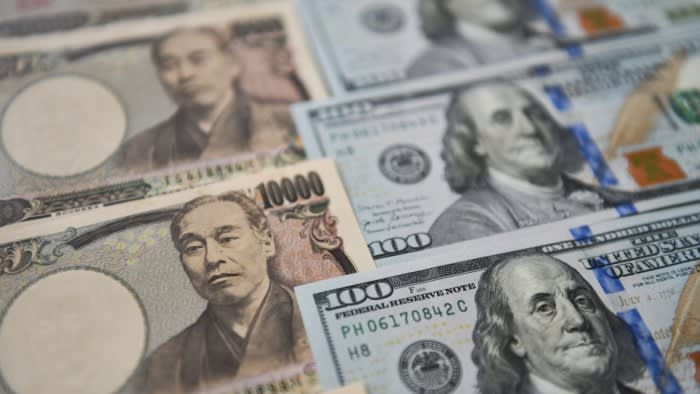Unlock the Editor’s Digest for free
Roula Khalaf, Editor of the FT, selects her favourite stories in this weekly newsletter.
Japan’s top currency diplomat said the government was ready to take action against “excess moves” in the yen as Asian currencies showed further weakness against a resurgent US dollar in the wake of Donald Trump’s election victory.
The Japanese yen fell past ¥154 against the dollar to briefly hit a fresh intraday low on Thursday taking it to its weakest level since late July. The yen has weakened against the greenback since mid-September as investors bet on slower interest rate rises in Japan.
Talking to reporters in Tokyo, Atsushi Mimura said the authorities were closely watching developments in the currency market “with utmost urgency” and that recent moves had been “one-sided and drastic”.
“We are ready to take appropriate actions against excess moves,” he said, in comments that represented the strongest warning to speculators in months.
China set its official exchange rate at the lowest level since last November at 7.166 to the dollar after the renminbi tumbled 1 per cent against the dollar on Wednesday.
The People’s Bank of China, which fixes the official rate of the currency, is expected to confront depreciation pressure if Trump follows through with his pledge to impose steep tariffs on all Chinese imports.
The currency moves come ahead of the next rate-setting decision by the US Federal Reserve later on Thursday when officials are widely expected to continue an easing cycle, cutting a quarter of a percentage point from its benchmark lending rate.
The US dollar was slightly weaker on Thursday, after what was its best session in more than two years. It was down 0.4 per cent against a basket of its peers including the pound and euro. US Treasuries were steady in thin Asia trading, with the 10-year yield at 4.42 per cent.
The impact of a Trump victory included “Asia FX downward pressure, higher US treasury yields, and tariffs”, said Société Générale analysts in a note. “A weaker for longer yen is an upside risk.”
South Korea’s won also touched an intraday low beneath Won1,400 to the dollar in morning trading, its lowest in two years.
Vietnam also set its reference rate for the dong at a record low. On Wednesday, an official from Indonesia’s central bank said the bank was prepared to stabilise the rupiah.
The US election outcome spurred “Trump trades”, with the dollar surging while Treasury yields rose, as investors steeled for the impact on the US and other economies of a package of tariffs and tax cuts. US stock indices notched all-time highs.
Asian markets were upbeat by the close of trading, with Hong Kong’s Hang Seng index advancing more than 2 per cent. The mainland CSI 300 climbed 3 per cent to rise 6.8 per cent over the past five sessions. Japan’s Topix was up 1 per cent while the tech-heavy Nikkei 225 closed down.
Investors are positioning for the National People’s Congress, the standing committee of China’s rubber-stamp parliament, to announce the next stage of the country’s stimulus on Friday.
“The key risk is on trade: we could start to hear pronouncements from Trump quite soon. In the short-term, a protective trade stance is supportive of the US dollar and poses a risk to growth outside of the US,” said Johanna Kyrklund, group chief investment officer at asset manager Schroders.
“We would expect the Chinese authorities to continue with stimulative policies to offset this.”
Additional reporting by Ian Smith in London
https://www.ft.com/content/8aecd4a8-5f24-4899-999b-8e93ac2f67b6


